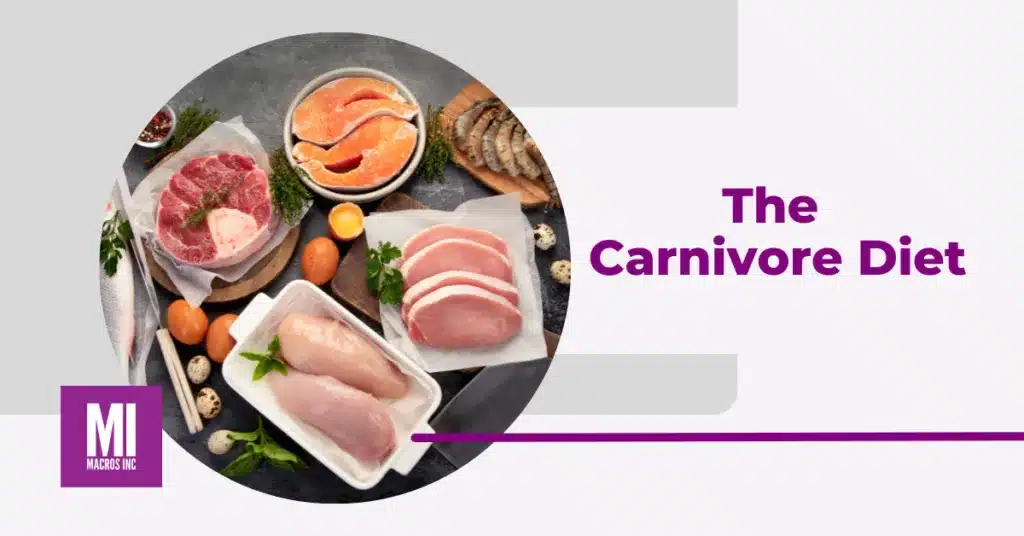Since weight loss is an ongoing pursuit for many, virtually every dietary approach conceivable has been tried at some point or another. Among these, the carnivore diet stands out by focusing entirely on meat. It is common for these diets to gravitate toward the absolutes, by excluding some sort of food group entirely. For example, keto diets focus on avoiding carbohydrate. Intermittent fasting avoids food entire for certain periods of time. Vegan diets exclude everything aside from plant-based foods.
So, what if we focus entirely on meat instead?
Welcome to the carnivore diet.
Jump to a Topic
The Carnivore Diet
What is the Carnivore Diet?
The carnivore diet is a pretty simple approach on paper. It calls for subsisting on animal based products, mostly in the forms of meat, eggs, and dairy. In some variants, the latter two are also excluded. Therefore, in terms of composition, it is virtually the polar opposite to a straight vegan diet.
The idea of animal-based diets has been around for centuries, enjoying periodic surges of popularity over time. One interesting historical advocate was James H. Salisbury. Yes, the guy who invented Salisbury steak also believed meat would cleanse the digestive system and promote weight loss. Just an interesting little anecdote.
Fast forwarding to the modern era, an orthopedic surgeon named Shawn Baker published The Carnivore Diet in 2018. From there, the diet began to make traction across social media. In particular, it was heavily propagated by media commentators such as Joe Rogan and Jordan Peterson.
Benefits
There are a lot of drawbacks to inflexible diets. Often, sacrifices come from mass exclusion of certain food groups, both in terms of health benefits, as well as dietary adherence as a whole. That being said, almost every dietary approach has at least some merits to it, and the carnivore diet is no exception. Here are a few of them.
Simplicity
As with other exclusionary diets, part of the appeal to the carnivore diet lies in its simplicity. You don’t have to memorize certain foods to avoid, or crunch numbers. It’s either something that comes from an animal, or it isn’t. That makes things rather easy to navigate.
Satiety
Of the three macronutrients, protein and fat tend to be the most satiating. Therefore, a diet that’s heavy in both tends to neutralize hunger fairly effectively. This is a large part of how this diet achieves fat loss – the dieter gets full faster and stays full longer, and thus ends up eating less overall. If that satiety puts the person in a calorie deficit, boom. You have fat loss.
Protein
The recommended daily allowance for protein is 0.8g/kg of bodyweight (approx. 0.36g/lb). However, additional benefits have been demonstrated going significantly higher than that, especially with regards to muscle retention in a calorie deficit. Depending on one’s dietary patterns, meeting optimal levels of protein can be rather difficult. A diet high in animal products tends to also be high in protein as well, making things significantly easier.
Micronutrients
There are micronutrients present in meat that are more difficult to obtain elsewhere. For example, one particular micronutrient of interest is iron. While iron can come from a variety of sources, not all of them are the same. Heme iron, i.e. the kind found in red meat, is absorbed easier and has higher bioavailability than non-heme iron. This makes red meat potentially superior to supplementation or plant-based iron sources. Given that approximately one in five women tend to be iron deficient at some point or another, this is a significant consideration.

Drawbacks of the Carnivore Diet
Alas, there are tradeoffs to everything. When you’re going in on a diet that drastically cuts off so many different food sources, there are always going to be drawbacks. Let’s talk about a few of them.
Micronutrients
While meat provides several beneficial micronutrients, it also cannot provide a much wider range of others, many of which must be supplemented. Some of the big ones to consider here are vitamin K, manganese, folate, and fiber. Of the four, I’ll touch mostly on fiber here.
Fiber has a myriad of different benefits for proper gut function. While not considered an essential micronutrient, there is an emerging body of evidence that our gut health plays a significant role in many different systems in our body. In particular, the bacteria in your gut ferment fiber and break it down. The interactions between these organisms, their metabolites, and the rest of the body is currently poorly understood. However, there have been implications for effects on many different health issues, from inflammation to colorectal cancer.
Plus, fiber helps you poop better, which is always a plus.
Trans Fat Intake
The one almost universally accepted negative dietary fat is trans fat. Trans fats have a different elemental bond structure than other fatty acids, making it much more stable, and much harder to break down.
Trans fats are relevant to the carnivore diet, as there is only one naturally occurring source of trans fats in nature – the milk and body fat of ruminants, such as cows. Trans fats encompass up to about 5% of the fat content in beef and dairy fat. While there is some evidence that naturally derived trans fats are less harmful than manufactured ones, this is a limited body of evidence on the matter. Additionally, there is at least some evidence that trans fat from cows still holds a risk for cardiovascular disease based mortality.
For the typical person, it is unlikely their red meat intake will contribute significant amounts of trans fat to their diet. This is conceivably a different story, however, if one’s diet revolves solely around meat.
Sustainability and Adherence
In terms of dieting and fat loss, this is arguably the biggest detriment to the carnivore diet.
A recurring trend with extremely restrictive diets is that they tend to be poor for long-term weight management. This is due to a couple of different factors. First, the more restrictive a diet is, the harder it tends to be to stick to it. Most weight loss endeavors take months, and the longer one has to deprive themselves of other foods, the less likely they’re going to stick to it.
The other big factor is after the diet ends. While a restrictive diet can achieve one’s target goal, it doesn’t necessarily set the dieter up for how to keep the weight off. Without some sort of pre-established long term habits in place, the propensity for weight regain is high. By contrast, many of the practices used by more moderate approaches can be continued after the diet ends.
Conclusion
The carnivore diet has been around for a while, and is enjoying a surge in popularity. While it certainly has potential for weight loss, many of its strengths can also be achieved with a more moderate approach. Meat is good for you. Just remember, it’s possible to have too much of a good thing. If a diet causes drastic changes to your eating patterns, it’s probably a good idea to take it with a grain of salt.
Now if you’ll excuse me, I’m going to go grab a steak and salad…
Try our nutrition coaching, for free!
Be the next success story. Over 30,000 have trusted Macros Inc to transform their health.
Simply fill out the form below to start your 14-day risk-free journey. Let's achieve your goals together!

